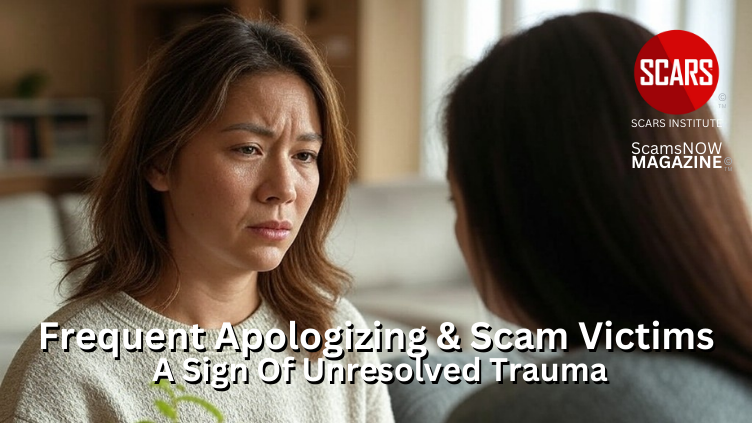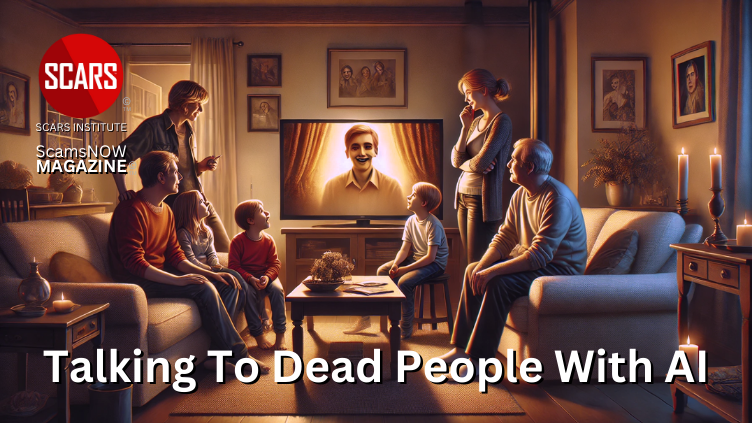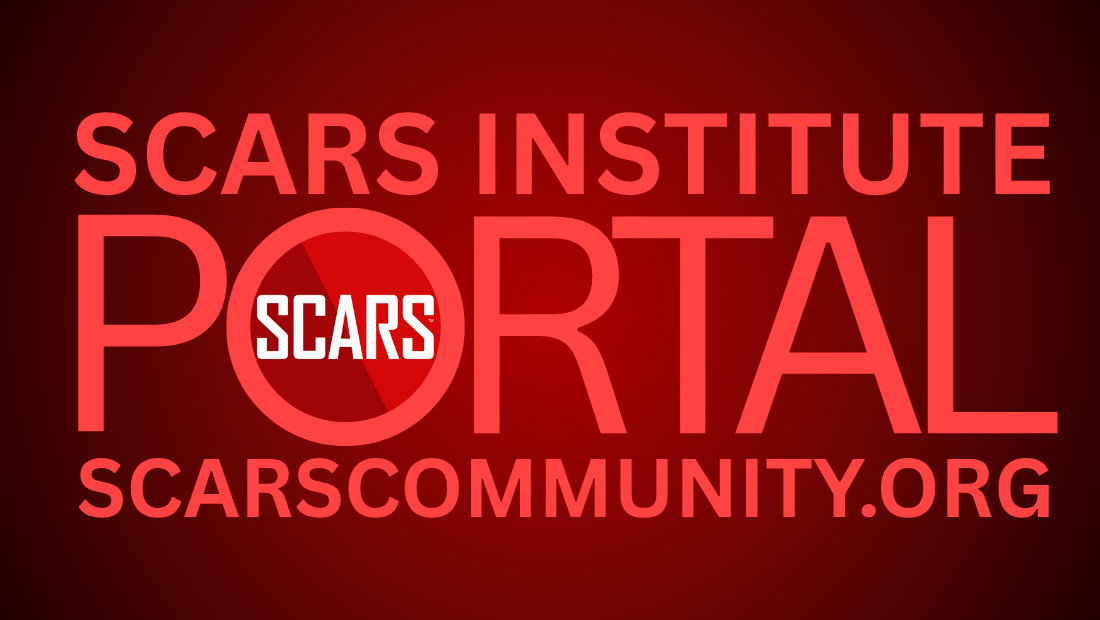Talking to Dead People through AI (Artificial Intelligence)
Talking to Dead People through AI: the Business of ‘Digital Resurrection’ Might Not be Helpful, Ethical… or Even Legal
Primary Category: Artificial Intelligence
Authors:
• Damián Tuset Varela – Investigador en Derecho Internacional Público e IA. Tutor Máster Relaciones Internacionales y Diplomacia UOC, UOC – Universitat Oberta de Catalunya
• SCARS Editorial Team – Society of Citizens Against Relationship Scams Inc.
About This Article
The concept of “digital resurrection,” where artificial intelligence recreates aspects of deceased individuals, such as their voice or likeness, has sparked significant ethical, philosophical, and legal debates. While these digital simulations may offer temporary comfort by mimicking loved ones, they risk altering authentic memories, raising questions about identity, consent, and the nature of existence. Such recreations can interfere with the grieving process, potentially preventing individuals from accepting loss and moving forward. The idealized representations created through these technologies often fail to capture the depth and uniqueness of a person’s lived experiences and relationships, leading to a distorted and artificial connection.
Moreover, the commercialization of grief through digital resurrection raises moral concerns about exploiting vulnerability for profit. Grieving is a deeply personal process, and the intrusion of businesses into this space can distort its natural progression, offering illusions of presence rather than fostering acceptance of absence. While the intentions of providing solace may be genuine, the ethical implications of profiting from loss remain troubling. Ultimately, digital resurrection presents a paradox: in attempting to bring us closer to those we have lost, it highlights the limitations of artificial simulations in capturing the essence of human existence and exacerbates the struggles of coping with grief.

Talking to Dead People through AI: the Business of ‘Digital Resurrection’ Might Not be Helpful, Ethical… or Even Legal
Earlier this year, a Spanish TV program showed several people listening to digital recreations of the voices of their deceased relatives that had been generated by artificial intelligence from real audio. It sparked widespread debate in both public and professional spheres, as these recreations not only mimicked loved ones’ voices but also asked poignant, evocative questions, provoking intense emotional reactions.
This phenomenon, which has been dubbed “digital resurrection”, involves using advanced AI technology to recreate certain aspects of deceased individuals, such as their voice or physical appearance. While it may offer momentary comfort, such a practice opens a raft of profound debates on ethical, philosophical, and legal fronts.
The Risk of Creating False Memories
Chief among the philosophical implications of digital resurrection is that it calls into question what it really means to “be”. By recreating the voice or likeness of someone who has passed away, we might believe we are extending their existence in some way, or perhaps that we are simply creating a shadow of them, lacking in substance.
However, the essence of a human being is undoubtedly more than a set of programmed responses or an image on a screen, and it seems unlikely that a digital simulation can capture the depth and uniqueness of a person’s lived experience, emotions, and thoughts.
Memory plays an important role here. Digital resurrection can be seen as an attempt to preserve memory, to maintain the presence of those we have lost. But human memory is not static – it selects, changes, shifts, and adapts, and by digitally recreating a person, we run the risk of altering our own authentic memories of them. Is it ethical to hold on to an artificial representation of someone, instead of letting the memory of them evolve and transform over time?
True Identity
A person’s identity is a complex web of experiences and relationships. When we try to recreate someone, we might think we are trying to capture their identity. However, we are more likely to create an idealized version of them, one that conforms to our own expectations and desires.
These technological advances also raise questions about grief itself. Death is a natural part of life, and mourning is essential for coming to terms with this loss. By trying to maintain a connection with the deceased through digital resurrection, we interfere with this vital process, which could prevent us from moving forward and finding peace in the acceptance of loss.
Ultimately, the digital resurrection also opens serious debate on the subject of consent and ownership. Who has the right to decide whether a person should be digitally recreated? And how can you handle the consent of someone who can, for obvious reasons, no longer express their wishes?
Exploiting Grief for Profit
We have to remember that technology is a business, and the prospect of companies making a profit by meddling with something as profoundly human and painful as the loss of a loved one raises further philosophical, ethical, and moral questions.
From an ethical point of view, this kind of business seems to transgress the fundamental principles of respect and dignity that should guide our human interactions. Grieving is an intimate and sacred process, a path to acceptance and inner peace after a significant loss. Commercial intrusion into this process could therefore be seen as a form of emotional exploitation, taking advantage of people at one of the most vulnerable moments in their lives.
Businesses of this sort could also distort the natural grieving process. Grief and loss are essential experiences of the human condition, and dealing with them helps us to grow as people. If commercially marketed digital resurrection prevents people from moving through this process in a healthy way – offering an illusion of a person’s presence rather than helping to accept the reality of their absence – it offers little by way of benefit.
From a moral perspective, the intentions and purposes of such businesses would be questionable. In principle, they seem to have the aim of providing comfort and a way of remembering loved ones. However, where do we draw the line between offering solace and exploiting grief for profit?
Digital Resurrection Exacerbates Grief
At the heart of “digital resurrection” lies a profound and disturbing paradox. In its attempt to bring us closer to those we have lost, technology confronts us with the inescapable reality of their absence, leading us to question not only the nature of existence but also the essence of what it means to be human.
By attempting to make up for the absence of a loved one or fill the void they have left, these technologies deepen both our desire to hold on to what we have lost and our own personal struggles to cope with and process grief in the face of the inescapable reality of death.
The paradox is further extended when we consider that, in our effort to preserve the memory and essence of loved ones, we resort to simulations that, by their artificial nature, can never fully capture the complexity and depth of real human experience. Thus, we are faced with an imperfect, digitized representation that, while comforting in some ways, struggles to do justice to the true essence of someone we have loved and lost.
From the Conversation
This article was originally published in Spanish
-/ 30 /-
What do you think about this?
Please share your thoughts in a comment below!
-/ 30 /-
What do you think about this?
Please share your thoughts in a comment below!
One Comment
Leave A Comment
TABLE OF CONTENTS
- Talking to Dead People through AI: the Business of ‘Digital Resurrection’ Might Not be Helpful, Ethical… or Even Legal
- About This Article
- Talking to Dead People through AI: the Business of ‘Digital Resurrection’ Might Not be Helpful, Ethical… or Even Legal
- The Risk of Creating False Memories
- True Identity
- Exploiting Grief for Profit
- Digital Resurrection Exacerbates Grief
CATEGORIES
![NavyLogo@4x-81[1] Talking to Dead People through AI (Artificial Intelligence) - 2024](https://scamsnow.com/wp-content/uploads/2025/04/NavyLogo@4x-811.png)
ARTICLE META
Important Information for New Scam Victims
- Please visit www.ScamVictimsSupport.org – a SCARS Website for New Scam Victims & Sextortion Victims.
- SCARS Institute now offers its free, safe, and private Scam Survivor’s Support Community at www.SCARScommunity.org – this is not on a social media platform, it is our own safe & secure platform created by the SCARS Institute especially for scam victims & survivors.
- SCARS Institute now offers a free recovery learning program at www.SCARSeducation.org.
- Please visit www.ScamPsychology.org – to more fully understand the psychological concepts involved in scams and scam victim recovery.
If you are looking for local trauma counselors, please visit counseling.AgainstScams.org
If you need to speak with someone now, you can dial 988 or find phone numbers for crisis hotlines all around the world here: www.opencounseling.com/suicide-hotlines
Statement About Victim Blaming
Some of our articles discuss various aspects of victims. This is both about better understanding victims (the science of victimology) and their behaviors and psychology. This helps us to educate victims/survivors about why these crimes happened and not to blame themselves, better develop recovery programs, and help victims avoid scams in the future. At times, this may sound like blaming the victim, but it does not blame scam victims; we are simply explaining the hows and whys of the experience victims have.
These articles, about the Psychology of Scams or Victim Psychology – meaning that all humans have psychological or cognitive characteristics in common that can either be exploited or work against us – help us all to understand the unique challenges victims face before, during, and after scams, fraud, or cybercrimes. These sometimes talk about some of the vulnerabilities the scammers exploit. Victims rarely have control of them or are even aware of them, until something like a scam happens, and then they can learn how their mind works and how to overcome these mechanisms.
Articles like these help victims and others understand these processes and how to help prevent them from being exploited again or to help them recover more easily by understanding their post-scam behaviors. Learn more about the Psychology of Scams at www.ScamPsychology.org
SCARS INSTITUTE RESOURCES:
If You Have Been Victimized By A Scam Or Cybercrime
♦ If you are a victim of scams, go to www.ScamVictimsSupport.org for real knowledge and help
♦ SCARS Institute now offers its free, safe, and private Scam Survivor’s Support Community at www.SCARScommunity.org/register – this is not on a social media platform, it is our own safe & secure platform created by the SCARS Institute especially for scam victims & survivors.
♦ Enroll in SCARS Scam Survivor’s School now at www.SCARSeducation.org
♦ To report criminals, visit https://reporting.AgainstScams.org – we will NEVER give your data to money recovery companies like some do!
♦ Follow us and find our podcasts, webinars, and helpful videos on YouTube: https://www.youtube.com/@RomancescamsNowcom
♦ Learn about the Psychology of Scams at www.ScamPsychology.org
♦ Dig deeper into the reality of scams, fraud, and cybercrime at www.ScamsNOW.com and www.RomanceScamsNOW.com
♦ Scam Survivor’s Stories: www.ScamSurvivorStories.org
♦ For Scam Victim Advocates visit www.ScamVictimsAdvocates.org
♦ See more scammer photos on www.ScammerPhotos.com
You can also find the SCARS Institute’s knowledge and information on Facebook, Instagram, X, LinkedIn, and TruthSocial
Psychology Disclaimer:
All articles about psychology and the human brain on this website are for information & education only
The information provided in this and other SCARS articles are intended for educational and self-help purposes only and should not be construed as a substitute for professional therapy or counseling.
Note about Mindfulness: Mindfulness practices have the potential to create psychological distress for some individuals. Please consult a mental health professional or experienced meditation instructor for guidance should you encounter difficulties.
While any self-help techniques outlined herein may be beneficial for scam victims seeking to recover from their experience and move towards recovery, it is important to consult with a qualified mental health professional before initiating any course of action. Each individual’s experience and needs are unique, and what works for one person may not be suitable for another.
Additionally, any approach may not be appropriate for individuals with certain pre-existing mental health conditions or trauma histories. It is advisable to seek guidance from a licensed therapist or counselor who can provide personalized support, guidance, and treatment tailored to your specific needs.
If you are experiencing significant distress or emotional difficulties related to a scam or other traumatic event, please consult your doctor or mental health provider for appropriate care and support.
Also read our SCARS Institute Statement about Professional Care for Scam Victims – click here
If you are in crisis, feeling desperate, or in despair, please call 988 or your local crisis hotline – international numbers here.
More ScamsNOW.com Articles
A Question of Trust
At the SCARS Institute, we invite you to do your own research on the topics we speak about and publish. Our team investigates the subject being discussed, especially when it comes to understanding the scam victims-survivors’ experience. You can do Google searches, but in many cases, you will have to wade through scientific papers and studies. However, remember that biases and perspectives matter and influence the outcome. Regardless, we encourage you to explore these topics as thoroughly as you can for your own awareness.

























![scars-institute[1] Talking to Dead People through AI (Artificial Intelligence) - 2024](https://scamsnow.com/wp-content/uploads/2025/04/scars-institute1.png)

![niprc1.png1_-150×1501-1[1] Talking to Dead People through AI (Artificial Intelligence) - 2024](https://scamsnow.com/wp-content/uploads/2025/04/niprc1.png1_-150x1501-11.webp)
De algún modo utilizar este recurso para traer de vuelta a un ser querido que ya murió.. es una forma de no aceptar que ya no sigue con nosotros.
Ciertamente todos lidiamos con los duelos de diferente manera. Pero personalmente creo que esto lejos ayudar puede unir más a la persona en una ilusión.